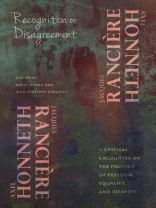Axel Honneth is best known for his critique of modern society centered on a concept of recognition. Jacques Rancière has advanced an influential theory of modern politics based on disagreement. Underpinning their thought is a concern for the logics of exclusion and domination that structure contemporary societies. In a rare dialogue, these two philosophers explore the affinities and tensions between their perspectives to provoke new ideas for social and political change.
Honneth sees modern society as a field in which the logic of recognition provides individuals with increasing possibilities for freedom and is a constant catalyst for transformation. Rancière sees the social as a policing order and the political as a force that must radically assert equality. Honneth claims Rancière’s conception of the political lies outside of actual historical societies and involves a problematic desire for egalitarianism. Rancière argues that Honneth’s theory of recognition relies on an overly substantial conception of identity and subjectivity. While impassioned, their exchange seeks to advance critical theory’s political project by reconciling the rift between German and French post-Marxist traditions and proposing new frameworks for justice.
表中的内容
Part I. Setting the Stage
1. Jacques Rancière and Axel Honneth: (Two?) Critical Approaches to the Political, by Katia Genel
2. Between Honneth and Rancière: Problems and Potentials of a Contemporary Critical Theory of Society, by Jean-Philippe Deranty
Part II. A Critical Encounter
3. Critical Questions: On the Theory of Recognition, by Jacques Rancière
4. Remarks on the Philosophical Approach of Jacques Rancière, by Axel Honneth
5. A Critical Discussion
Part III. The Method of Critical Theory: Propositions
6. The Method of Equality: Politics and Poetics, by Jacques Rancière
7. Of the Poverty of Our Liberty: The Greatness and Limits of Hegel’s Doctrine of Ethical Life, by Axel Honneth
Notes
Bibliography
Index
关于作者
Axel Honneth is professor of philosophy at the Johann Wolfgang Goethe University of Frankfurt and the Jack C. Weinstein Professor for the Humanities at Columbia University. He is also the author of the Columbia University Press books Pathologies of Reason: On the Legacy of Critical Theory (2009) and Freedom’s Right: The Social Foundations of Democratic Life (2014).Jacques Rancière is professor of philosophy emeritus at the University of Paris VIII. Among his major works translated into English are Hatred of Democracy (2007), Aesthetics and Its Discontents (2009), and Mute Speech: Literature, Critical Theory, and Politics (Columbia, 2011).Katia Genel is associate professor of philosophy at the University of Paris I—Panthéon-Sorbonne.Jean-Philippe Deranty is associate professor of philosophy at Macquarie University, Sydney.












